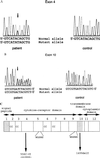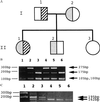Identification of mutations in the c-mpl gene in congenital amegakaryocytic thrombocytopenia
- PMID: 10077649
- PMCID: PMC15907
- DOI: 10.1073/pnas.96.6.3132
Identification of mutations in the c-mpl gene in congenital amegakaryocytic thrombocytopenia
Abstract
Congenital amegakaryocytic thrombocytopenia (CAMT) is a rare disorder expressed in infancy and characterized by isolated thrombocytopenia and megakaryocytopenia with no physical anomalies. Our previous hematological analysis indicated similarities between human CAMT and murine c-mpl (thrombopoietin receptor) deficiency. Because the c-mpl gene was considered as one of the candidate genes for this disorder, we analyzed the genomic sequence of the c-mpl gene of a 10-year-old Japanese girl with CAMT. We detected two heterozygous point mutations: a C-to-T transition at the cDNA nucleotide position 556 (Q186X) in exon 4 and a single nucleotide deletion of thymine at position 1,499 (1,499 delT) in exon 10. Both mutations were predicted to result in a prematurely terminated c-Mpl protein, which, if translated, lacks all intracellular domains essential for signal transduction. Each of the mutations was segregated from the patient's parents. Accordingly, the patient was a compound heterozygote for two mutations of the c-mpl gene, each derived from one of the parents. The present study suggests that at least a certain type of CAMT is caused by the c-mpl mutation, which disrupts the function of thrombopoietin receptor.
Figures



References
-
- Freedman M H, Estov Z. Am J Pediatr Hematol Oncol. 1990;12:225–230. - PubMed
-
- Alter B P. In: Hematology of Infancy and Childhood. Nathan D G, Oski F A, editors. Philadelphia: Saunders; 1987. pp. 159–241.
-
- Bartley T D, Bogenberger J, Hunt P, Li Y-S, Lu H S, Martin F, Chang M-S, Samal B, Nichol J L, Swift S, et al. Cell. 1994;77:1117–1124. - PubMed
-
- de Sauvage F J, Hass P E, Spencer S D, Malloy B E, Gurney A L, Spencer S A, Darbonne W C, Henzel W J, Wong S C, Kuang W J, et al. Nature (London) 1994;369:533–538. - PubMed
Publication types
MeSH terms
Substances
Grants and funding
LinkOut - more resources
Full Text Sources
Other Literature Sources
Molecular Biology Databases

